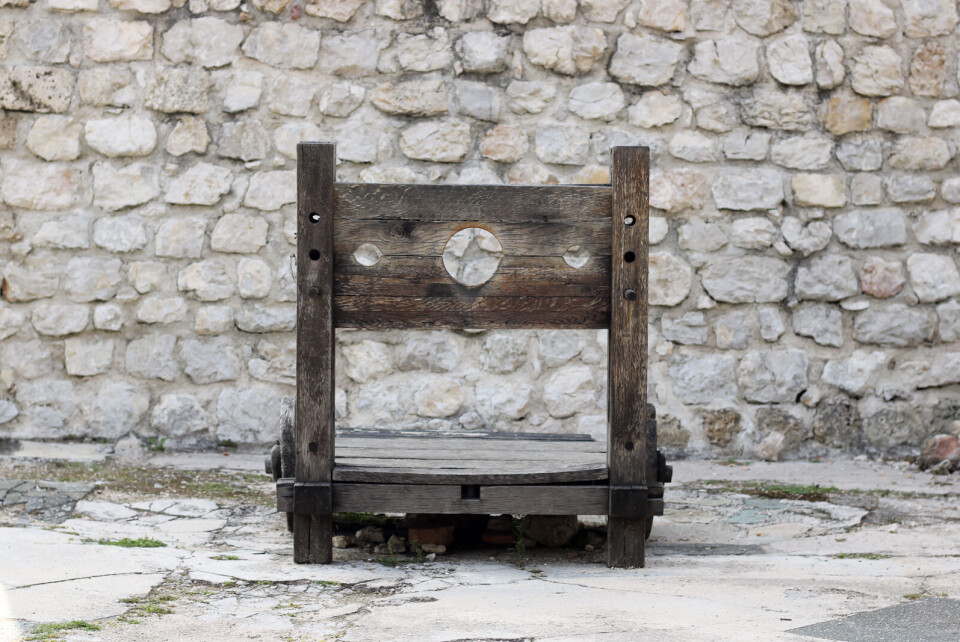-
Auvergne region is neglected by government
Government agencies and the SNCF shun the area 'time and time again', says reader
-
France’s 1970s roller disco craze is back – and we tried it
Columnist Sarah Henshaw feels a yearning for a certain kind of retro fun
-
Trump’s rhetoric feeds France’s long tradition of national decline
Columnist Nabila Ramdani offers a view on the American president's impact on French culture
Calls to bring back guillotine ‘defy French law’
A populist suggestion to reinstate the death penalty in France is constitutionally impossible, says Amnesty International’s Anne Denis

It is legally impossible to bring back the death penalty in France despite a majority of people (according to a 2020 poll) and a potential presidential candidate being in favour of capital punishment, says a leading Amnesty International campaigner.
On the eve of the 40th anniversary of the abolition of the death penalty (September 18), far-right polemicist Eric Zemmour said he was “philosophically... in favour” of executions during an interview on French TV.
The writer, who has not officially declared a candidacy for the 2022 presidential race but is estimated to have around 10% of vote ‘intentions’ if he does, went on to claim “a majority of French people are in favour of the death penalty, even today”.
However, Anne Denis, head of the Death Penalty, Torture and Health Commission for Amnesty International France, was quick to pour cold water on the idea, saying it would be unconstitutional. “It is legally impossible to reinstate the death penalty. In 2007, the abolition of capital punishment was written into the French Constitution, so if you bring it back, you will, in fact, have to make a Sixth Republic with a new constitution.
'Legally impossible to reinstate the death penalty'
“France also signed a second protocol for the International Covenant on Civil and Political Rights that same year for the abolition of the death penalty. This really is the most important protocol and, within it, it says there is no turning back.
“It is legally impossible to reinstate the death penalty. If we did, we would have no standing in the international community. Zemmour knows this. He is just saying it to gain votes.
“There is no sense in what he says but the public does not know this. They have no idea of the complex international treaties. It is easy for the right wing to use this argument to win votes but it is impossible, thankfully.”
The death penalty - which was by guillotine - was abolished in France in 1981 during the early stages of Socialist François Mitterrand’s presidency.
The last person to be guillotined here (and, indeed, in the world) was Hamida Djandoubi on September 10, 1977 in a Marseille prison. An agricultural worker who had lost a leg in a workplace accident, he was accused of the torture and murder of his girlfriend who refused his orders to prostitute herself to other men.
At the time, more than 60% of the population was in favour of capital punishment. Despite this Mitterrand’s justice minister Robert Badinter succeeded in pushing the bill through to abolish executions on September 18, 1981, with 363 in favour and 117 against. The former lawyer, now aged 93, gave an historic, two-hour speech to members of parliament, in which he argued that only totalitarian regimes had the death penalty.
“In countries of liberty, abolition is almost always the rule; in countries where dictatorship reigns, the death penalty is always practised,” he told lawmakers at the time.
When the law came into force, France became the 29th country in the world to renounce the death penalty. In 2021, 144 countries have abolished the death penalty in law or practice.
Nevertheless, 55% of French people would be in favour of restoring it, a poll by Ipsos/Sopra Steria for the left-wing think-tank Fondation Jean-Jaurès, Montaigne Institute and Le Monde revealed last year.
'Public opinion is fickle'
Ms Denis insists readers should not take surveys like this too seriously.
“Polls depend on how and when the question is asked. Public opinion is fickle. If asked in the aftermath of a particularly heinous crime or in a context of great violence, the answer will be in favour of the death penalty.
“This is human, but it is a matter of revenge, and the role of a state is not to orchestrate revenge but to dispense justice,” she said.
Amnesty International’s latest report on the death penalty recorded 483 executions in 18 countries in 2020, the lowest number of executions it has recorded in the past decade.
Most known executions took place in China, Iran, Egypt, Iraq and Saudi Arabia – in that order.
China remains the world’s leading executioner, but the true extent of the use of the death penalty there is unknown as the data is classified as a state secret.
























